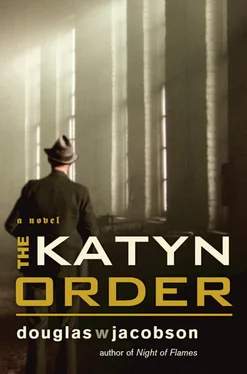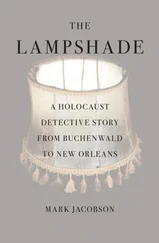They’d been on the run for a month since evacuating Old Town through the sewers, and Natalia wasn’t sure she could last another day. She doubted any of them could. They were out of ammunition, there was no food or water, the streets were littered with corpses and communications had completely broken down. They were surrounded by the enemy, and the last flickers of life in the insurgency were about to be snuffed out. Natalia knew it was only a matter of time. For some units of the AK still entrenched in isolated areas, perhaps a few days. In her case, perhaps just a few minutes.
Natalia leaned back against the brick building and closed her eyes, thinking about Adam. She knew where he’d gone that night on Dluga Street, just before she followed Rabbit into the sewer. A commando in one of the last groups to escape had seen him entering Raczynski Palace, the makeshift hospital where hundreds of wounded AK commandos were trapped. Trying to protect them from the SS was a suicide mission. But considering the torment in Adam’s heart, the hatred and revenge that had driven him for years, she knew why he went there.
A week later she heard the news. When the Germans moved into Old Town, the SS stormed Raczynski Palace and murdered everyone—doctors, nurses, patients in their beds. She had cried that night, cried for what might have been.
She heard a noise.
It was the all-too-familiar clanking of tank treads, and she slid backward on her rump, deeper into the corner between the two buildings where the late afternoon shadows provided some cover.
The same chaotic streets that had separated her from her friends a couple of hours ago were now suddenly deserted as the grinding noise of the enemy tanks drew closer. The moment the artillery barrage ceased, those who were still standing knew what was coming next. They abruptly vanished, scurrying into cellars and alleyways like rodents before a flood.
The rumbling diesel engines and creaking treads escalated into a deafening crescendo. A shiver ran down Natalia’s back as she scrunched against the building. The noise echoed off the buildings, and the ground shook violently as the monstrous machines approached.
A loud bang jolted every bone in her body.
Another bang!
Then guttural shouts in German: “Raus! Raus! Fucking Polish Dogs! Raus jezst!”
Natalia crouched, frozen with fear as a blur of black-uniformed SS troopers flashed past the walkway, tossing grenades through cellar windows.
Screams and belching smoke filled the air. Doors flew open, and terrified civilians raced up the cellar stairs and into the walkway, faces blackened with soot. A man with his clothes on fire rolled on the ground, screaming. A woman clutching a baby drenched in blood wailed in agony, then sank to her knees.
Natalia struggled to her feet, ignoring the pain in her ankle, as a squad of SS storm troopers charged into the walkway, sealing it off from the street. The people who had fled the cellar suddenly fell silent, huddling together, moving backward, shoving Natalia against the building.
The SS troopers advanced.
A thunderous burst of machine-gun fire reverberated off the brick walls.
The people screamed in panic and clawed at each other.
A hot, piercing pain shot through Natalia’s forehead and dropped her to her knees. The man in front of her grunted and collapsed backward, knocking her flat. Someone fell on top of her and jammed her face into the ground.
Then it was quiet.
Natalia lay still, her head throbbing, the dead weight of the bodies on top of her threatening to crush her ribs. She struggled to turn her head to the side and get some air. Boots scraped on the cobblestones as the troopers kicked at the bodies. They grunted German phrases and laughed. Then the boots walked away.
Through the tangle of bodies, Natalia caught a glimpse of bloodstained cobblestones in the fading sunlight. A puddle of blood had pooled in a depression; red slowly faded into brown as the liquid soaked into the earth between the stones. The puddle blurred and then smeared into darkness.
2 OCTOBER
MOVEMENT AWAKENED HER. Natalia opened one eye. Her other eye, pinned against the cobblestones, was crusted shut. She heard voices—heavy, crude voices—laughing and cursing.
Ukrainians.
She caught a glimpse of their boots in the dim light. It was daylight, but probably early, she thought, just after dawn. They were shabby boots, dusty and worn, holes in the soles. How many are there?
The pile of corpses on top of her shifted, and the weight on her ribs lightened a bit as the Ukrainians pulled off one of the bodies. She could understand only a few words, but enough to realize they were looters. It sounded like there were two of them. As another body was dragged onto the cobblestones, Natalia wished now she’d been killed by the Nazi machine gunners.
The body lying directly on top of her moved, and Natalia closed her eye, playing dead, praying they wouldn’t touch her.
But she knew what would happen.
A large, calloused hand grabbed her collar and jerked her up. She yelped as her swollen ankle was dragged across the stones.
The Ukrainian bent down and grabbed her hair, forcing her head back. He had a round, almost boyish face, blue eyes and a shock of unruly brown hair. He laughed and said something to his partner, his breath stinking of onions and tobacco. Natalia couldn’t understand him, but it didn’t matter.
The Ukrainian grabbed her by the lapels of her uniform jacket and hoisted her to her feet. The pain in her ankle almost caused her to pass out. His partner now appeared in her field of vision. This one also looked young, though taller, with broad shoulders and a dark, stubbly beard. Both of them were grinning like children with a new toy. The round-faced one reached under her jacket and fondled her breast, then rolled his eyes and spat on the ground. The bearded one jostled him out of the way and reached for her belt.
Natalia twisted her body, trying to back away, but Round Face slapped her, sending a searing bolt of pain through her forehead where the bullet had grazed her. He grabbed her by the hair again and jerked her head back.
Someone shouted from the other end of the walkway. At first Natalia couldn’t make out the words. Then she heard them again. “Halt! Stoppen Sie!”
Round Face’s grip loosened, and his hand fell away.
Two soldiers marched toward them from the street.
Natalia’s stomach tightened as she realized they were Germans.
The one on the right, an officer, glared at the two Ukrainians. “Raus!” he commanded and jerked his thumb toward the street. “Raus! Schnell! Mach schnell!” He reached for the pistol strapped to his waist and shouted again, louder. “Raus! Schweinhunds!”
The Ukrainians made a wide circle around the two Germans, then bolted for the street.
Natalia slumped to the ground.
The officer put a hand on her shoulder. “Can you stand?” he asked in German-accented Polish.
Natalia flinched.
“Yes, I know,” the officer said. “I get that all the time, a German officer who speaks Polish.” He looked to be in his fifties with a narrow face, and a pencil-thin, gray mustache. His uniform was Wehrmacht. Though Natalia could barely breathe, she was thankful that at least he wasn’t SS.
“I was a military attaché to Poland in the thirties,” the officer said casually. “I lived here in Warsaw for six years. So, can you stand, or do you need help?”
Natalia swallowed and shook her head. “I can’t… it’s my ankle.”
The officer barked a few terse commands to his subordinate, who turned and jogged back toward the street. Then he knelt down and touched her ankle gently. When Natalia flinched again, he took his hand away.
Читать дальше












